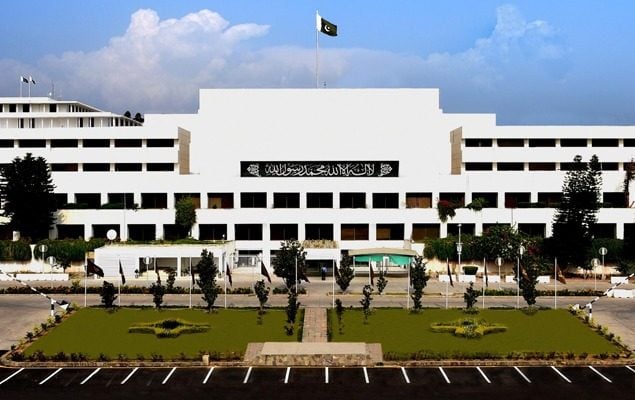
National Assembly of Pakistan. The lower house of parliament.
In Pakistan’s charged political landscape, few subjects ignite as much debate as the military’s role in governance. The proposed 27th Constitutional Amendment, currently under discussion, has thrust this issue back into the national spotlight particularly because of the sweeping changes it proposes to Article 243, which governs the command and structure of Pakistan’s armed forces.
What Article 243 Says?
At its core, Article 243 of the Constitution of Pakistan outlines the relationship between the country’s civilian leadership and its military establishment. It empowers the President, acting on the advice of the Prime Minister, to appoint the Chairman of the Joint Chiefs of Staff Committee (CJCSC) and the chiefs of the Army, Navy, and Air Force.
However, the 27th Amendment seeks to alter that balance giving the Army Chief authority not only over the Army but also over the Air Force and Navy. This would effectively centralize military command under a single uniformed authority.
End of CJCSC and Rise of Chief of Defense Force:
Under the proposed amendment, the traditional post of Chairman of the Joint Chiefs of Staff Committee (currently held by General Sahir Shamshad Mirza, set to retire on November 27) would be abolished, along with the newly created but short-lived position of Chief of Defense Force (CDF).
The Army Chief, General Asim Munir, is expected to assume comprehensive command an unprecedented consolidation of military power.
Supporters of this move argue it will enhance “unity of command” and improve coordination among the three services. “Given the challenges faced by the country, there is a need to ensure unity of command within the armed forces,” said defense analyst Brigadier (Retd.) Haris Nawaz.
Five-Star Rank and Lifetime Immunity:
Perhaps the most controversial aspect of the 27th Amendment is the constitutional elevation of the five-star rank a position that, until now, was largely symbolic. The amendment would formally recognize the rank, granting lifetime immunity and permanent privileges to any officer holding it.
Under the proposed changes, a five-star officer could not be removed except by a two-thirds parliamentary majority a level of protection exceeding that enjoyed by an elected government. In contrast, a Prime Minister can be removed by a simple majority vote of no confidence.
If enacted, this amendment would make General Asim Munir only the second five-star officer in Pakistan’s history after Field Marshal Ayub Khan and would grant him enduring influence over the country’s military and strategic affairs.
A New Command for National Security:
The amendment also proposes establishing a National Strategic Command (NSC) a body tasked with overseeing Pakistan’s strategic and nuclear forces. Notably, the Commander of the NSC would be appointed solely from the Army, in consultation with the Army Chief or Chief of Defense Force.
This clause further cements the Army’s institutional dominance over the country’s most sensitive security portfolios.
Constitutional and Legal Hurdles:
Legal experts note that such sweeping changes must comply with Article 10-A, which guarantees due process and procedural fairness in all legislative actions. Any attempt to alter the military command structure without full parliamentary scrutiny could face constitutional challenges.
But critics see it differently. They warn that this amendment could further tilt the balance of power toward the Army, marginalizing the Air Force and Navy and eroding institutional checks within the defense establishment.
Lieutenant General (Retd.) Naeem Khalid Lodhi cautioned that the Army Chief should not also serve as Chief of Defense Force, advocating for a separate four-star appointment “to maintain institutional balance.”
Military Power and Civilian Authority:
Since independence in 1947, Pakistan’s military and particularly the Army has been the most powerful institution in the state. With four successful coups and decades of indirect military rule, its influence over politics, foreign policy, and internal security is deeply entrenched.
The 27th Amendment, critics argue, risks formalizing that dominance within the Constitution itself making civilian oversight even more difficult.
Proponents, however, claim the changes are pragmatic meant to streamline defense leadership and strengthen national unity at a time of regional instability.
Reform and Reinforcement:
As the 27th Amendment moves toward parliamentary debate, Pakistan faces a defining question:
Will this constitutional reform bring greater coherence to the armed forces or will it institutionalize military supremacy in a country where civilian authority has long struggled to assert itself?
Whatever the outcome, the reshaping of Article 243 is likely to leave a lasting imprint on Pakistan’s civil-military balance one that could define the nation’s political trajectory for years to come.
Read More News On
Catch all the Pakistan News, Trending News, Breaking News Event and Latest News Updates on The BOL News
Download The BOL News App to get the Daily News Update & Follow us on Google News.




